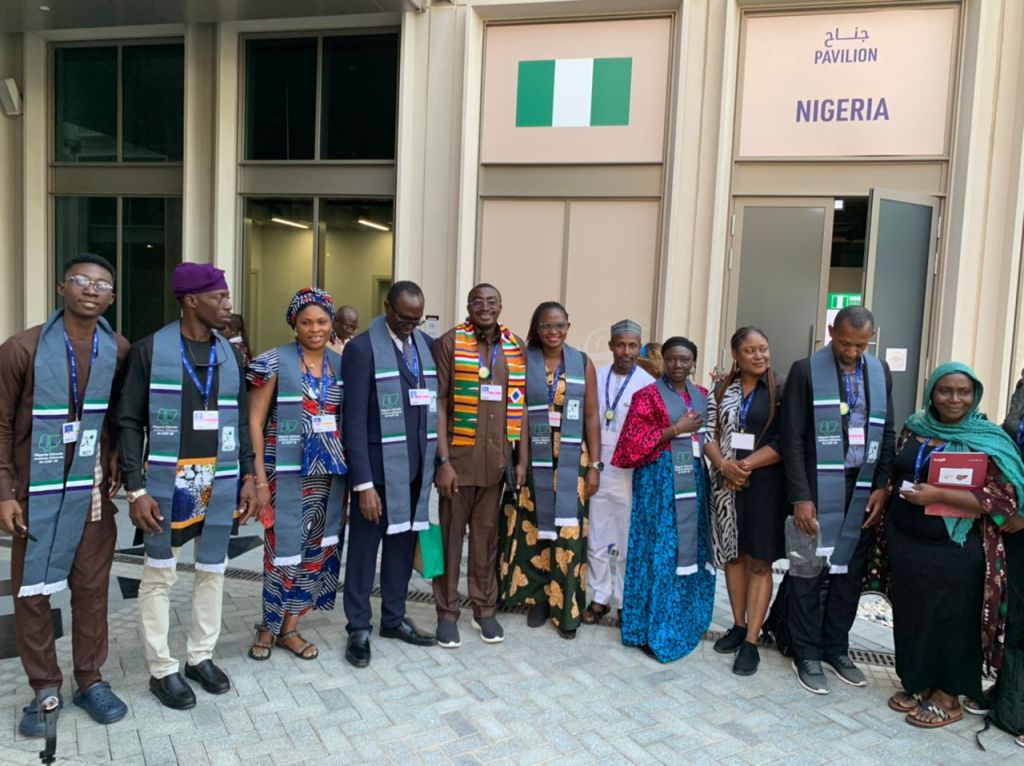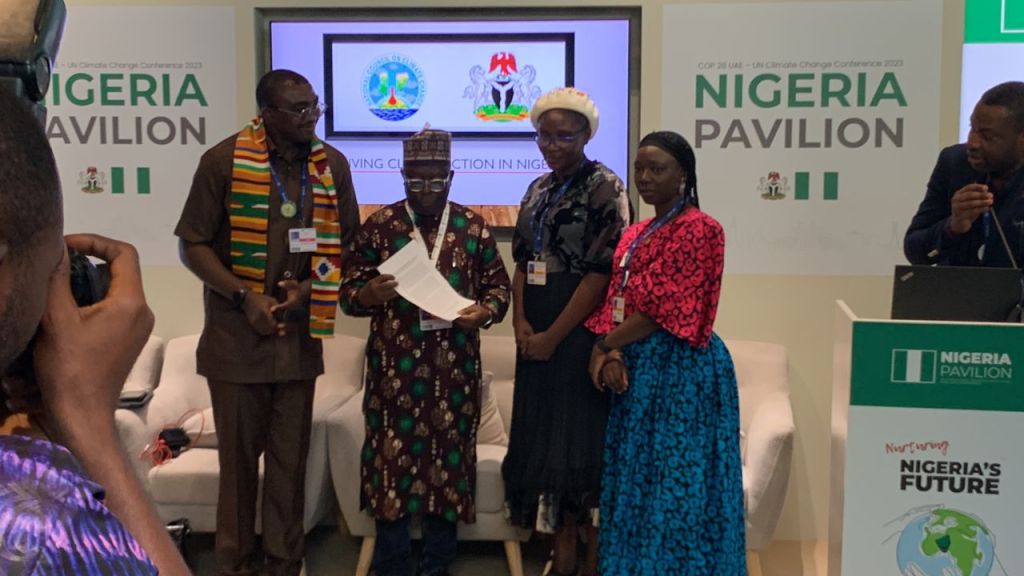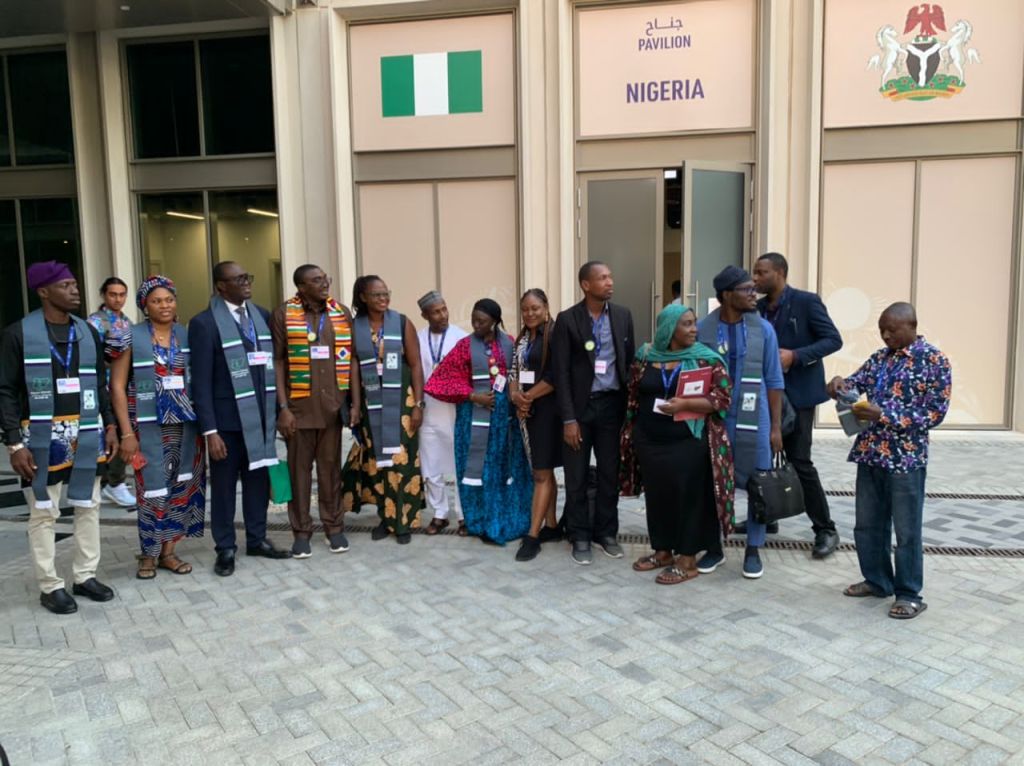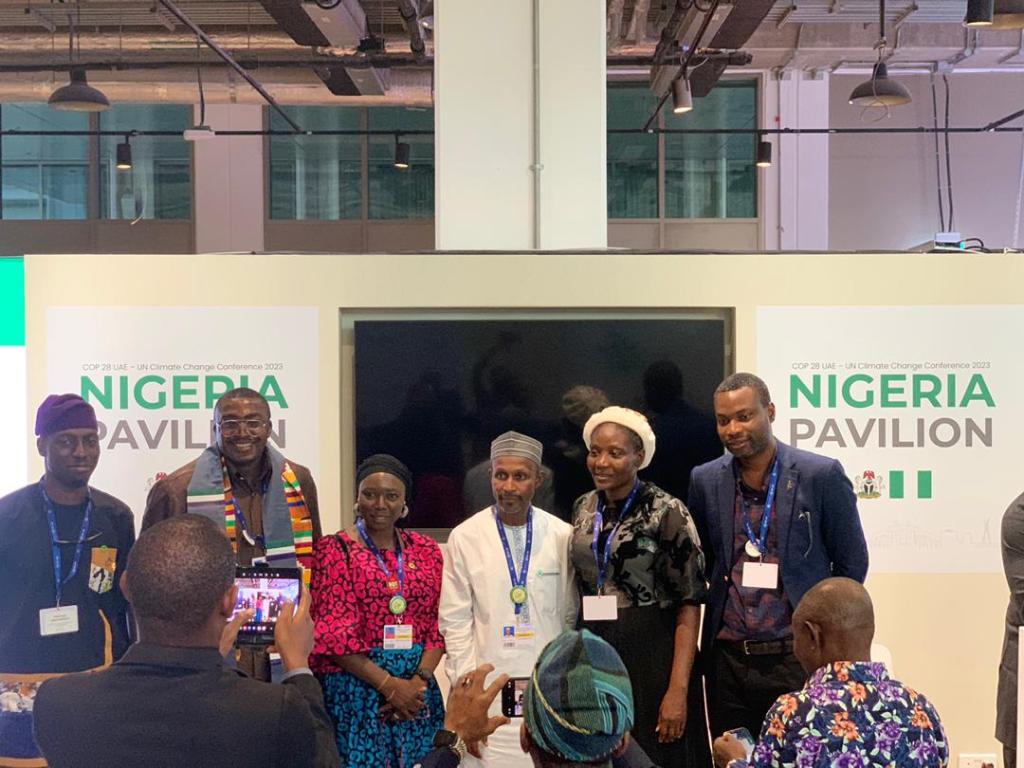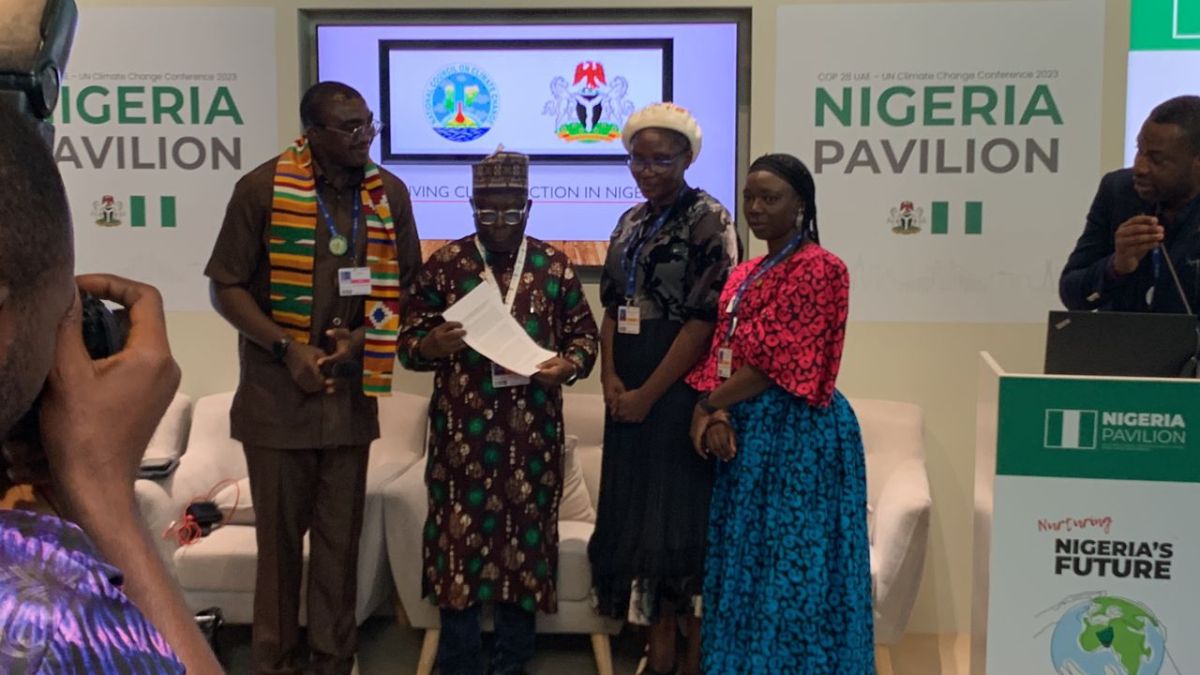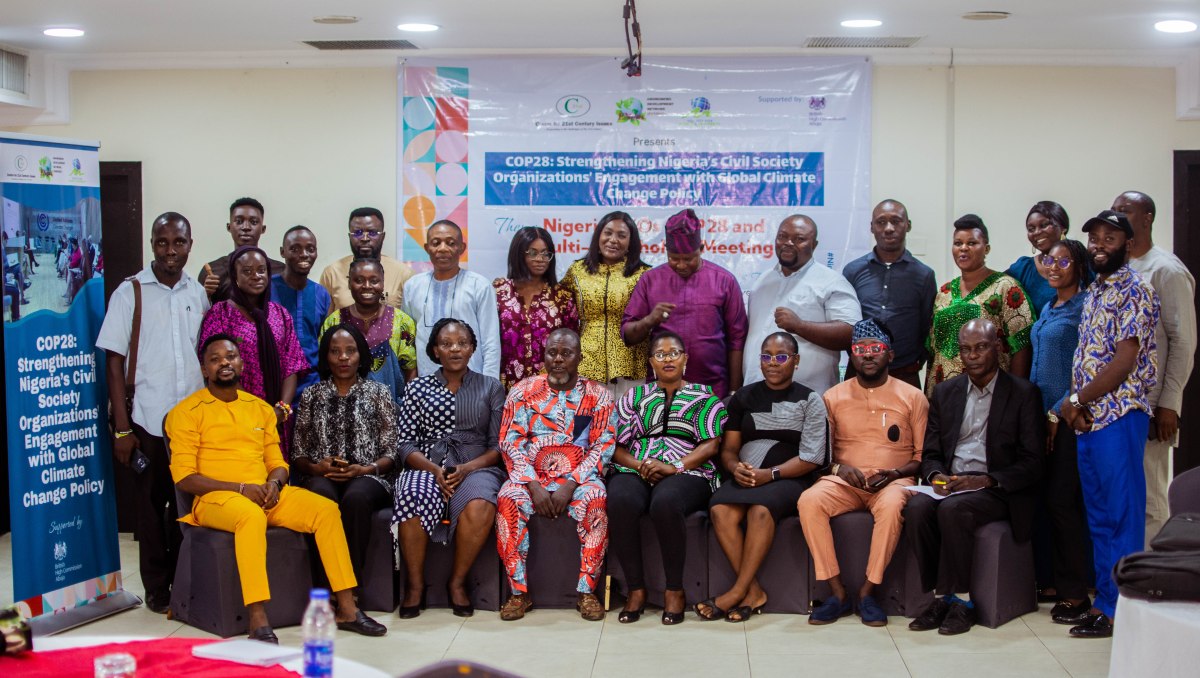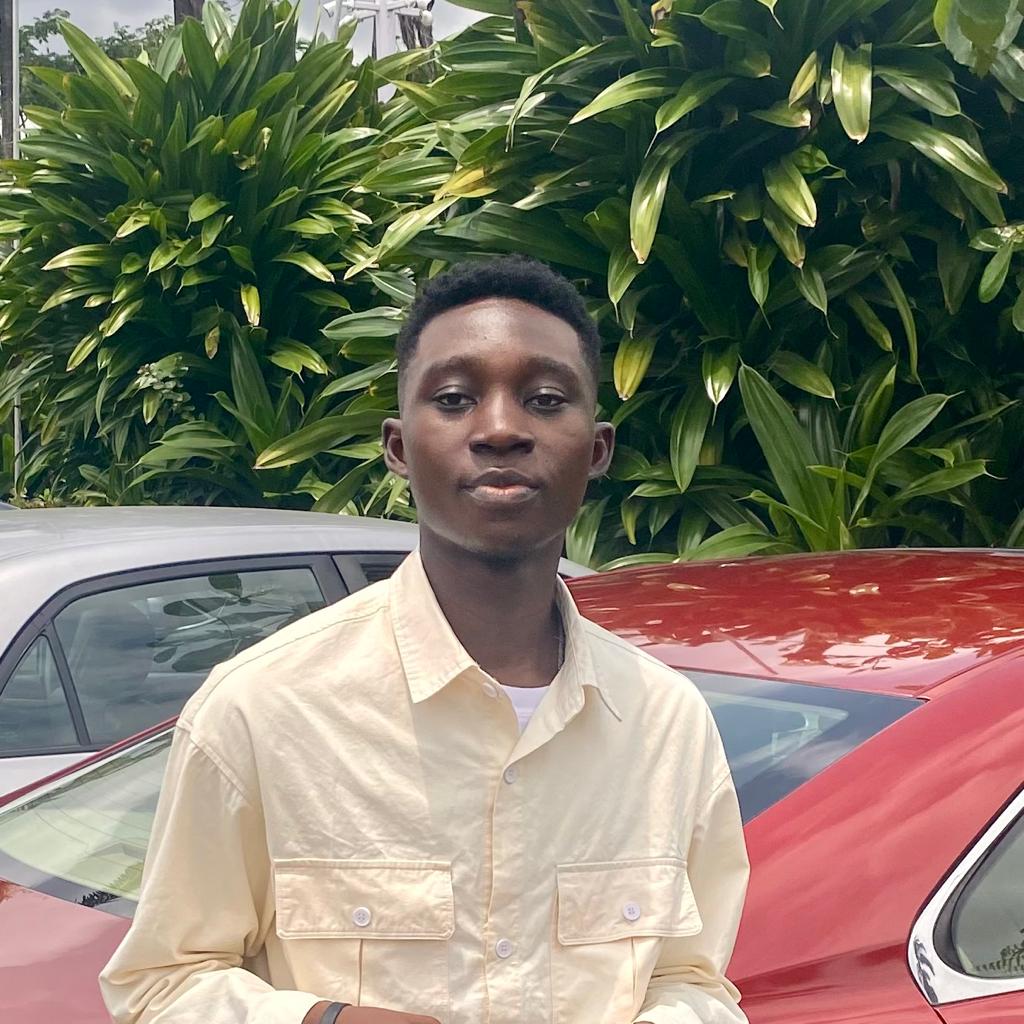Dubai, December 6, 2023
The first half of COP28 negotiations and events were held from November 30th to December 6. 2023, saw an active and impactful participation of Civil Society Organizations (CSOs) from Nigeria. During the first half, Nigerian CSOs actively engaged in approximately 30 side events, with representatives delivering impactful speeches on various climate-related topics.
The mobilization of CSOs at COP28, led by the Centre for 21st Century Issues (C21st), Society for Planet and Prosperity (SPP), and Environews Development Network (Endenet) with support from Foreign, Commonwealth and Department Office (FCDO), British High Commission (BHC) in partnership with the Nigeria Climate Justice Alliance (NCJA) has been remarkably phenomenal. The collaboration between these organizations has continued to facilitate daily briefings and regular updates for CSOs on the ongoing negotiations and events at COP28. This enabled the Nigerian CSOs to stay abreast of all streams of developments and make their voices heard and visible.
One notable highlight of the first half was the invitation extended to the CSOs leadership to participate in the first-ever Nigeria Day celebration at COP28. During this momentous occasion, the Nigerian CSOs position was successfully conveyed to Dr. Salisu Dahiru, the Director-General of the Nigerian Climate Change Commission (NCCC). The Director General, who was excited by the activities of the CSOs committed to transmit the CSOs position to the Nigerian President. This recognition of the CSOs’ efforts signifies a new impetus for collaboration and affirms the importance of their role in shaping climate policies and conversations at such a global level.
The positive momentum gained at COP28 will be continued through the remaining days at COP28 and a post-COP28 meeting, which aims to further enhance cooperation between CSOs and the Nigerian government to foster global engagement. This opportunity will also allow for the exploration of new avenues to advance climate action and achieve meaningful progress in addressing the pressing challenges of climate change at the national and subnational level in Nigeria with CSOs as frontiers of development.
The collective efforts displayed so far by Nigerian CSOs at COP28 demonstrate their unwavering commitment to climate action and their determination to contribute to a more sustainable future for Nigeria. These efforts and dedication are commendable and one can only look forward to their continued endeavors in driving positive change in Nigeria and beyond.
Nigeria’s Civil Society Organizations (CSOs) deeply regret the media’s negative portrayal of the country’s delegates to COP28. This portrayal, viewed as misinformation, has the potential to undermine the progress made in opening up the climate space that CSOs have tirelessly fought for over the decades.
It is crucial to note that some Nigerian CSOs have achieved observer status with the United Nations Framework Convention on Climate Change (UNFCCC). This acknowledgment highlights their credibility and expertise in matters related to the climate crisis. As observers, they possess the authority to register participants for COP and actively contribute to shaping the climate agenda.
Nigeria’s Govt Participation:
Nigeria’s Civil Society Organizations (CSOs) commend the Government of Nigeria for its active participation in COP28, marking a significant turning point in the country’s commitment to climate action. For the first time, Nigeria has sent a strong signal to the global community, showcasing its readiness to mobilize climate finance and collaborate with stakeholders to address the impacts of climate change within Nigeria.
During the first week of COP28, Nigeria achieved several notable milestones, marking quick wins in its pursuit of climate action. These achievements include:
- Launching of Nigeria’s Long term Low Carbon Emission Development Strategy
- Nigeria Carbon Market Activation
- Signing of MOU with Siemens
- Promising Discussions with development partners and investors to mobilize climate finance for Nigeria
Statement on Key Climate Agenda Items
Loss and Damage
Nigerian Civil Society Organizations (CSOs) warmly welcome the early operationalization of the Loss and Damage Fund during the first week of COP28. This significant step highlights progress in addressing the losses and damages experienced by communities on the frontlines of climate change. However, Nigerian CSOs emphasize the urgent need for expeditious establishment of the fund’s operational details, particularly the swift submission of pledges. The current pledge of $655 million falls far short of the actual finance required, which amounts to trillions, to adequately address the daily sufferings of affected climate-vulnerable communities.
Adaptation
On the agenda of the Global Goal on Adaptation (GGA), Nigerian CSOs advocate for increased efforts to ensure the realization of doubling adaptation finance by 2025. It is imperative that an action plan, clearly outlining the path toward this goal, be developed. While a commitment of $14 billion to adaptation finance has been made, it remains insufficient compared to the actual requirements.
Mitigation
Regarding mitigation, Nigerian CSOs acknowledge the progress made by many countries in delivering Low-Carbon Development and Just Transition strategies. However, they emphasize the importance of incorporating gender equity and addressing existing vulnerabilities and marginalization. It is crucial that the transition to a low-carbon society actively includes and safeguards the rights and well-being of all, particularly the most vulnerable populations and a specific definition of Just Transition for the developing countries.
Climate Finance
Recognizing the vital significance of climate finance, Nigerian CSOs stress that the current pledges are inadequate. The global goal on climate finance requires urgent and serious attention, with the realization of fair and realistic metrics that can effectively address the world’s response to climate change. Adequate financing is the lifeblood of climate action, and urgent action is needed to achieve the scale required.
Conclusion
As the negotiations enter the second round, Nigerian CSOs call for concrete action and heightened commitment across all negotiation streams. It is crucial to align the discussions and decisions with the temperature goal outlined in the Paris Agreement and deliver climate finance at a significant scale.
Nigerian CSOs remain steadfast in their dedication to pushing for meaningful outcomes during COP28. They call upon all stakeholders to demonstrate real commitment and take decisive steps to address the pressing challenges of climate change. By working collaboratively, we can build a more sustainable and resilient future for Nigeria and the global community.
Signed
Titilope Gbemisola Akosa
Executive Director
Centre for 21st Century Issues (C21st)
For Convening organizations
Dubai, December 6, 2023
The first half of COP28 negotiations and events were held from November 30th to December 6. 2023, saw an active and impactful participation of Civil Society Organizations (CSOs) from Nigeria. During the first half, Nigerian CSOs actively engaged in approximately 30 side events, with representatives delivering impactful speeches on various climate-related topics.
The mobilization of CSOs at COP28, led by the Centre for 21st Century Issues (C21st), Society for Planet and Prosperity (SPP), and Environews Development Network (Endenet) with support from Foreign, Commonwealth and Department Office (FCDO), British High Commission (BHC) in partnership with the Nigeria Climate Justice Alliance (NCJA) has been remarkably phenomenal. The collaboration between these organizations has continued to facilitate daily briefings and regular updates for CSOs on the ongoing negotiations and events at COP28. This enabled the Nigerian CSOs to stay abreast of all streams of developments and make their voices heard and visible.
One notable highlight of the first half was the invitation extended to the CSOs leadership to participate in the first-ever Nigeria Day celebration at COP28. During this momentous occasion, the Nigerian CSOs position was successfully conveyed to Dr. Salisu Dahiru, the Director-General of the Nigerian Climate Change Commission (NCCC). The Director General, who was excited by the activities of the CSOs committed to transmit the CSOs position to the Nigerian President. This recognition of the CSOs’ efforts signifies a new impetus for collaboration and affirms the importance of their role in shaping climate policies and conversations at such a global level.
The positive momentum gained at COP28 will be continued through the remaining days at COP28 and a post-COP28 meeting, which aims to further enhance cooperation between CSOs and the Nigerian government to foster global engagement. This opportunity will also allow for the exploration of new avenues to advance climate action and achieve meaningful progress in addressing the pressing challenges of climate change at the national and subnational level in Nigeria with CSOs as frontiers of development.
The collective efforts displayed so far by Nigerian CSOs at COP28 demonstrate their unwavering commitment to climate action and their determination to contribute to a more sustainable future for Nigeria. These efforts and dedication are commendable and one can only look forward to their continued endeavors in driving positive change in Nigeria and beyond.
Nigeria’s Civil Society Organizations (CSOs) deeply regret the media’s negative portrayal of the country’s delegates to COP28. This portrayal, viewed as misinformation, has the potential to undermine the progress made in opening up the climate space that CSOs have tirelessly fought for over the decades.
It is crucial to note that some Nigerian CSOs have achieved observer status with the United Nations Framework Convention on Climate Change (UNFCCC). This acknowledgment highlights their credibility and expertise in matters related to the climate crisis. As observers, they possess the authority to register participants for COP and actively contribute to shaping the climate agenda.
Nigeria’s Govt Participation:
Nigeria’s Civil Society Organizations (CSOs) commend the Government of Nigeria for its active participation in COP28, marking a significant turning point in the country’s commitment to climate action. For the first time, Nigeria has sent a strong signal to the global community, showcasing its readiness to mobilize climate finance and collaborate with stakeholders to address the impacts of climate change within Nigeria.
During the first week of COP28, Nigeria achieved several notable milestones, marking quick wins in its pursuit of climate action. These achievements include:
- Launching of Nigeria’s Long term Low Carbon Emission Development Strategy
- Nigeria Carbon Market Activation
- Signing of MOU with Siemens
- Promising Discussions with development partners and investors to mobilize climate finance for Nigeria
Statement on Key Climate Agenda Items
Loss and Damage
Nigerian Civil Society Organizations (CSOs) warmly welcome the early operationalization of the Loss and Damage Fund during the first week of COP28. This significant step highlights progress in addressing the losses and damages experienced by communities on the frontlines of climate change. However, Nigerian CSOs emphasize the urgent need for expeditious establishment of the fund’s operational details, particularly the swift submission of pledges. The current pledge of $655 million falls far short of the actual finance required, which amounts to trillions, to adequately address the daily sufferings of affected climate-vulnerable communities.
Adaptation
On the agenda of the Global Goal on Adaptation (GGA), Nigerian CSOs advocate for increased efforts to ensure the realization of doubling adaptation finance by 2025. It is imperative that an action plan, clearly outlining the path toward this goal, be developed. While a commitment of $14 billion to adaptation finance has been made, it remains insufficient compared to the actual requirements.
Mitigation
Regarding mitigation, Nigerian CSOs acknowledge the progress made by many countries in delivering Low-Carbon Development and Just Transition strategies. However, they emphasize the importance of incorporating gender equity and addressing existing vulnerabilities and marginalization. It is crucial that the transition to a low-carbon society actively includes and safeguards the rights and well-being of all, particularly the most vulnerable populations and a specific definition of Just Transition for the developing countries.
Climate Finance
Recognizing the vital significance of climate finance, Nigerian CSOs stress that the current pledges are inadequate. The global goal on climate finance requires urgent and serious attention, with the realization of fair and realistic metrics that can effectively address the world’s response to climate change. Adequate financing is the lifeblood of climate action, and urgent action is needed to achieve the scale required.
Conclusion
As the negotiations enter the second round, Nigerian CSOs call for concrete action and heightened commitment across all negotiation streams. It is crucial to align the discussions and decisions with the temperature goal outlined in the Paris Agreement and deliver climate finance at a significant scale.
Nigerian CSOs remain steadfast in their dedication to pushing for meaningful outcomes during COP28. They call upon all stakeholders to demonstrate real commitment and take decisive steps to address the pressing challenges of climate change. By working collaboratively, we can build a more sustainable and resilient future for Nigeria and the global community.
Signed
Titilope Gbemisola Akosa
Executive Director
Centre for 21st Century Issues (C21st)
For Convening organizations
